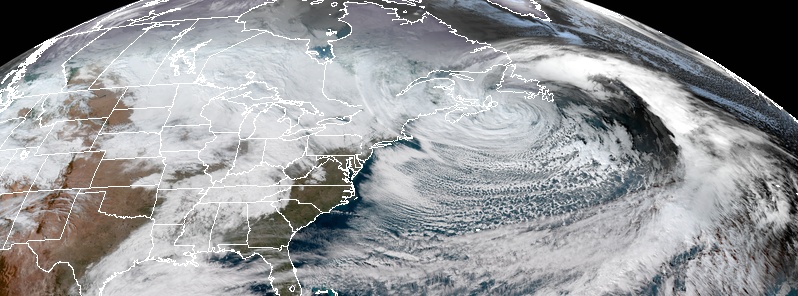Heavy wet snow leaves 250 000 homes without power in Nova Scotia, Canada

A powerful winter storm is affecting parts of eastern Canada, causing a massive power outage in Nova Scotia, high water levels and heavy pounding surf.
At the peak of the storm, nearly 250 000 Nova Scotia Power customers were left without power, many of them in the Halifax area. It was Nova Scotia's worst power outage since Hurricane "Juan" in September 2003.
Those outages have largely been restored, but thousands are still affected from Yarmouth to central and northern Nova Scotia and into Cape Breton, CBC reports.
According to Nova Scotia Power, very heavy wet snow has dragged down power lines, weighing them down and breaking in some cases.
"We've also had trees bend over, weighed down by that heavy snow and being pushed down by high winds that have broken poles and lines," company's spokesperson Tiffany Chase said.
"A major transmission line near Port Hawkesbury was the main reason those in the Halifax area didn't have electricity. It experienced a series of cascading events that caused it to go down," she explained. "That line is sort of the backbone of the system that flows the electricity from our generating plant in Cape Breton to customers on the mainland of Nova Scotia and into Halifax metro."
Storm surges are expected in the coastal areas of northern and eastern Nova Scotia, including coastal areas of Cape Breton and the Bras d'Or Lake, Environment Canada warns.
"For north-facing coastlines, these high water levels combined with heavy pounding surf will continue to give coastal flooding until the tides recede later tonight," it said.
"Surge and waves can cause impacts well inland. Stay away from affected shorelines. People close to the shoreline should stay on the lookout for worsening conditions."
The agency said the storm would bring up to 25 cm (10 inches) of snow in northern and northeastern Nova Scotia, with lesser amounts expected for the north-facing coasts.
Winds of up to 100 km/h (62 mph) are also expected.
Featured image credit: NOAA/GOES-East. Acquired: November 29, 2018

Commenting rules and guidelines
We value the thoughts and opinions of our readers and welcome healthy discussions on our website. In order to maintain a respectful and positive community, we ask that all commenters follow these rules.